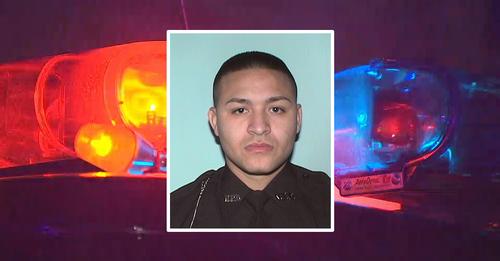
Ex-NJ Officer Jovanny Crespo Sentenced to 27 Years for Shooting Death of Gregory Griffin and Wounding of Passenger in 2019 Chase
A former New Jersey police officer, Jovanny Crespo, has been sentenced to a total of 27 years in prison for the shooting death of one man and the wounding of another during a high-speed car chase that occurred 5 1/2 years ago in Newark. Superior Court Judge Michael Ravin delivered the sentence on Friday, emphasizing the need to deter officers from adopting a “shoot-first, ask-questions-later” mentality. Crespo received 20 years for aggravated manslaughter and seven years for aggravated assault, with these sentences to be served consecutively. Additionally, the judge imposed six-year terms for official misconduct, which will run concurrently with the other sentences.
The courtroom was a scene of intense emotion as the 31-year-old Crespo sunk back into his chair and his family members wept upon hearing that he would not be eligible for parole for 22 years and 11 months. Earlier, Crespo had wept as his mother and sister pleaded for leniency, and he later stood to briefly apologize to the victims’ families.
The incident, which took place in January 2019, was captured on dashboard and police body camera videos. These videos showed Crespo leaping out of his patrol car and firing his weapon three times during the pursuit. According to Essex County prosecutors, state guidelines permit the use of deadly force only if the officer or someone else is in imminent danger of death or serious bodily harm. The chase, lasting five minutes, ended in the death of 46-year-old driver Gregory Griffin and left his passenger critically wounded.
Defense attorney Isaac Wright Jr. argued for leniency, claiming that Crespo had been on the job for less than two years and had received inadequate training. Wright also contended that Crespo’s superiors should have called off the chase. However, prosecutors countered that Crespo had trained at the police academy for more than six months and had been thoroughly instructed on the proper use of deadly force. Judge Ravin sided with the prosecution, describing Crespo as “extensively trained” and labeling the chase as an “abhorrent abuse of police power.”
The high-speed chase began when police officers attempted to stop a car driven by Gregory Griffin for a traffic violation. Griffin, accompanied by a passenger, sped away, leading officers on a dangerous pursuit through the streets of Newark. The chase reached a critical point when Crespo, determined to apprehend Griffin, exited his patrol car and fired his weapon, resulting in Griffin’s death and severe injuries to his passenger.
The aftermath of the incident sparked significant controversy and public outcry. Many questioned the decision to pursue Griffin so aggressively and criticized the use of deadly force. The case highlighted broader concerns about police practices and the use of force, particularly in high-pressure situations.
During the trial, the prosecution presented compelling evidence, including the dashboard and body camera footage, to argue that Crespo’s actions were unjustified and reckless. The footage showed Crespo firing at the vehicle as it sped away, raising doubts about whether he or anyone else was in immediate danger. Prosecutors emphasized that police officers are trained to use deadly force only as a last resort and must carefully assess the threat level before acting.
The defense, on the other hand, portrayed Crespo as a young and inexperienced officer who was overwhelmed by the situation. Wright argued that Crespo had been inadequately supported by his superiors and lacked the necessary experience to handle such a high-stakes scenario. Despite these arguments, the judge was not swayed, concluding that Crespo’s actions represented a severe breach of his duties as a law enforcement officer.
The sentencing of Crespo to 27 years in prison has been seen as a significant statement on the part of the judicial system regarding police accountability. Judge Ravin’s remarks underscored the importance of holding officers to the highest standards and ensuring that they do not misuse their authority. The case also prompted calls for improved training and oversight of police officers to prevent similar incidents in the future.
Family members of the victims expressed relief that justice had been served but also sorrow for the lives irrevocably changed by the tragic events. Gregory Griffin’s family described him as a loving father and a valued community member whose life was cut short needlessly. They called for systemic changes to prevent such tragedies from happening again.
The case has also reignited discussions about police reform and the need for comprehensive changes to law enforcement practices. Advocates for police reform argue that the case illustrates the urgent need for better training, increased accountability, and a reevaluation of policies regarding the use of force. They contend that such measures are essential to restoring public trust in law enforcement and ensuring that officers act responsibly and ethically.
In the broader context, the Crespo case is part of a larger national conversation about police conduct and the use of force. High-profile cases of police violence have led to widespread protests and demands for change. The sentencing of Crespo is seen by some as a step towards greater accountability, but many believe that much more needs to be done to address the systemic issues within law enforcement.
As Crespo begins his prison sentence, the impact of his actions will continue to resonate within the Newark community and beyond. The case serves as a stark reminder of the responsibilities that come with the badge and the devastating consequences that can result from a failure to uphold those responsibilities. It also highlights the ongoing efforts to reform policing practices and ensure that officers are equipped to serve and protect their communities with integrity and respect.
In conclusion, the sentencing of former Newark officer Jovanny Crespo to 27 years in prison marks a significant moment in the ongoing struggle for police accountability. The case underscores the critical importance of proper training, oversight, and adherence to ethical standards in law enforcement. As the community continues to heal from the tragic events of January 2019, there is hope that this case will lead to meaningful changes that will prevent future abuses of police power and ensure that justice is served for all.



